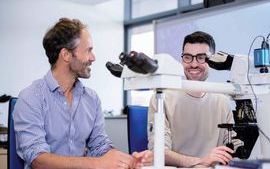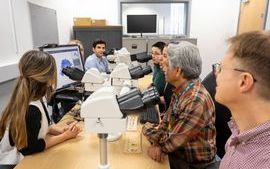- Published:
- 22 April 2025
- Author:
- Dr Ryan Clark
- Read time:
- 3 Mins
In this profile, Dr Ryan Clark explains his background and the route he took into pathology, and covers his motivation and hopes for how the Bulletin can continue to appeal to trainee pathologists.
It is wonderful to meet you all in this virtual format. I am Dr Ryan Clark. I have recently stepped into this role as the Bulletin’s Trainee Section Editor at the Royal College of Pathologists. I am very excited to share some of my thoughts, interests and hopes for the role going forward with you today.
To tell you a little about myself, I am a histopathology trainee in Glasgow and a Train and Retain Academic Cancer Clinicians clinical lecturer at the University of Glasgow. I became interested in a career in pathology during medical school, when I undertook a Student Selected Component in histopathology during my third year. Honestly, I thought I was going to hate it but that it would be great learning for my career! However, I was inspired by the way in which pathology answered so many questions that I had. I love to understand ‘why’, and a specialty that focuses on the scientific basis of disease, therefore, appealed to me. Furthermore, everyone I met was kind, supportive and considered in their advice. From that point, I never looked back and everything I did was pathology-focused. It was the best decision I could have made!
Unfortunately, during my medical school career, I also became disabled from a giant cell tumour of bone – sadly worsened by a delayed diagnosis due to bias and poor communication. I really appreciated in that moment just how much power medicine has over patients' lives, and the need for excellent and timely communication.
I will also never forget that the relatively short wait for my pathology report was the most difficult time for me. Waiting for an unknown amount of time for an important diagnosis made me further appreciate the importance of pathology in the patient pathway and the need to advocate for our importance. As we all know, this is something which is becoming more challenging due to funding issues, staffing issues and the development of backlogs of cases. I cannot imagine how much more difficult my life would have been if my diagnosis was delayed further.
Coming from one of the poorest areas in the UK, I had always had an interest in how we best serve all patients. Very frequently, I saw both first-hand and from the experience of friends and family how poor communication can drive worsening inequality. A combination of these 2 experiences cemented my interest in challenging and improving responses to discrimination within medicine. This led to my first foray into College work in the EDI network, where I have pushed forward issues, such as use of terminology in College documents and in assessments, and the importance of considering indirect discrimination within College policy, and organised an upcoming seminar on race in medicine.
My experiences within clinical medicine, teaching, research and equity work are all driven by a few similar basic principles:
- that excellent communication can effectively drive forward change and best practice
- that a wide variety of perspectives are needed to truly understand medicine, especially EDI perspectives, and the recognition that my perspective is but one of these
- and that trainees play an important and often underappreciated and underutilised role in pathology.
It is these lessons that I bring to the Bulletin and these are the motivations that drove me to apply. I want to bring the trainee perspective to the forefront and champion our voices further within the Bulletin.
How, then, do I put these principles into practice within my role? As the Trainee Section Editor, I attend meetings with the Bulletin editorial team, suggest ideas based on what trainees might find interesting and useful, and then commission these as articles. I liaise with the authors directly and provide suggestions and considerations for the article. These form my core tasks within the role.
However, there are many more tasks that are equally important in directing my thoughts and ideas on what makes a good trainee-focused article. I attend Trainees' Advisory Committee meetings and maintain strong links with its members of all specialties, to ensure that I am guided by what is important across specialties and across the whole of the UK. I will be relying on the inspiration, guidance and considered opinions of all my colleagues as I progress through my tenure.
Given this, what then can you expect from me as the Trainee Section Editor? I have 3 key expectations that I hope everyone will hold me to: first, articles for all residents, not just for the things that interest me; second, careful and considered explorations of all perspectives, especially EDI perspectives; and third, wider representation of trainees within the Bulletin in every issue. I look forward to working for and with all of you in this role and I cannot wait to see what we achieve!
Read next
Reasonable adjustments for trainees
22 April 2025
Overcoming challenges in pathology training
22 April 2025




